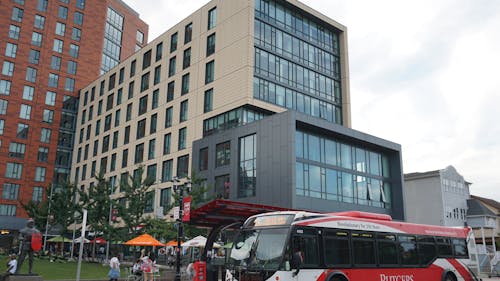Students call for investment in better U. buses, housing at budget hearing

On Wednesday, students shared their criticisms of the University's bus system and housing at the Open Hearing on Tuition, Fees and Housing hosted by the Committee on Academic and Student Affairs and Committee on Finance and Facilities in the Rutgers Board of Governors.
The hearing started at 6 p.m. and allowed registered speakers and commenters to discuss financial issues with the University governors before they finalize the upcoming academic year's budget.
On April 19, the Office of the Secretary announced in a University-wide email that the format of the meeting would shift from an in-person format to a virtual one.
Many students talked about the bussing system, including Miranda Alperstein, a first-year Master of City and Regional Planning student in the Edward J. Bloustein School of Planning and Public Policy, who said that those who use the bus system at Rutgers—New Brunswick suffer from bus bunching, overcrowding, disorganized arrivals and few bus routes and stops.
Many graduate students opt to reside in neighboring Highland Park, which is not served by the University's buses, and Alperstein said they arrive late to class, even after allocating more than 40 minutes to travel.
Alisa Wyrick, another graduate student in the Bloustein School, said the buses pose an obstacle to their education as a working parent who commutes to class. Due to the difficulty of predicting bus departures and arrivals, they said they often walk between their car on the Cook and Douglass campuses and then walk to their class in Downtown New Brunswick, but making the return trip at night can be unsafe.
"On that walk, I would never see a bus pass by. It is unacceptable to ask students to leave an extra 45 minutes to get to and from class, often on top of a commute from elsewhere in New Jersey," Wyrick said. "Adding a significant amount of time to plan for the current bus commute, as it stands, to get to class poses a huge barrier to attending and paying tuition to Rutgers."
Ashwathi Renjith, a School of Arts and Sciences sophomore, said they leave one hour in advance to account for the buses' unpredictability — time that could be better spent on schoolwork or extracurricular activities.
They added that bus stops provide little to no protection against the elements. In one instance, Renjith said they were stuck in pouring rain for more than 20 minutes at the Biel Road bus stop on Cook campus.
Renjith and Alperstein both pushed for reallocation of funding from the New Jersey Innovation and Technology Hub, including the University's partnership with Tel Aviv University, toward an improved bus system.
Cybil Bailey, a first-year Master of City and Regional Planning student in the Bloustein School, identified herself as a member of OverRide, a student group built to advocate for improvements in the bussing system at Rutgers. Due to unaffordable parking near her classes, she said she often waits more than 15 minutes at a time at the SoCam 290 Apartments bus stop in Downtown New Brunswick after 9 p.m., but she faces inaccurate bus arrival times in the Passio GO! app as well as overcrowding.
Other students critiqued the University's investments, spoke against tuition increases, advocated for graduate pay equity and raised concerns about on-campus housing conditions.
Andrew Gosselin, a third-year Ph.D. student in the Department of Biomedical Engineering, provided several accounts of on-campus housing issues in the Nichols and Buell Apartments on Busch campus, including recurring mold, bugs and a lack of air conditioning.
Andrew Curtis, a first-year Ph.D. student in the Graduate School of Education, said he has mold in the Johnson Apartments on Busch campus. He also said a window repair took "no less than three" calls to fix, and he has yet to receive the curtains he requested.
Chidera Ntiwunka-Ifeanyi, a second-year graduate student in the Department of Biomedical Engineering, said they had black mold in their on-campus housing, for which they had to call the building's maintenance crew three times. They are also experiencing an ant infestation, extremely high indoor temperatures and flooding.
"The amount of money you're trying to save and put in your pockets is going to be ripped out through your soul if you do not take care (of the buildings)," they said.



